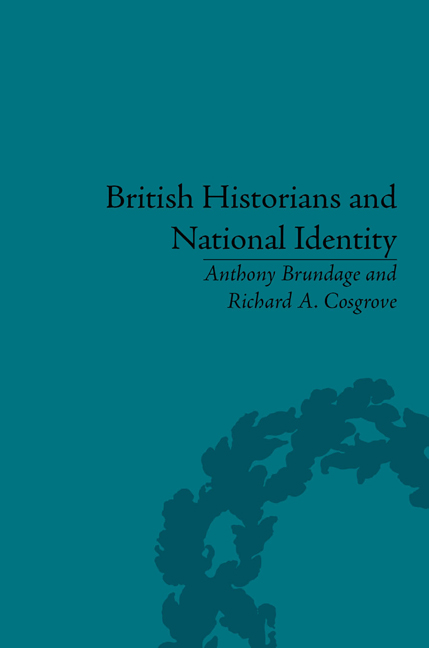Book contents
- Frontmatter
- CONTENTS
- Dedication
- Acknowledgements
- Introduction
- 1 Demythologizing the Nation's Past: David Hume's History of England
- 2 Catharine Macaulay's Vindication of Radicalism and the Republican Tradition
- 3 Reassessing Religion and the National Narrative: John Lingard and the English Reformation
- 4 Placing the Constitution at the Heart of National Identity: Henry Hallam and Constitutional History
- 5 Thomas Babington Macaulay: Writing the History of a Progressive People
- 6 The Glories of the Reformation and the Origins of Empire: J. A. Froude's Celebration of the Tudor Era
- 7 Edward Augustus Freeman: Liberal Democracy and National Identity
- 8 William Stubbs: The Continuity of English History as National Identity
- 9 Celebrating the People: J. R. Green's Short History
- 10 Samuel Rawson Gardiner: Incorporating Dissent into the National Story
- 11 In Thrall to English Tradition and Character: G. M. Trevelyan's Panoramic Histories of the Island Race
- 12 The Anglosphere as Global Model: Winston Churchill's History of the English-Speaking Peoples
- Conclusion
- Notes
- Works Cited
- Index
11 - In Thrall to English Tradition and Character: G. M. Trevelyan's Panoramic Histories of the Island Race
- Frontmatter
- CONTENTS
- Dedication
- Acknowledgements
- Introduction
- 1 Demythologizing the Nation's Past: David Hume's History of England
- 2 Catharine Macaulay's Vindication of Radicalism and the Republican Tradition
- 3 Reassessing Religion and the National Narrative: John Lingard and the English Reformation
- 4 Placing the Constitution at the Heart of National Identity: Henry Hallam and Constitutional History
- 5 Thomas Babington Macaulay: Writing the History of a Progressive People
- 6 The Glories of the Reformation and the Origins of Empire: J. A. Froude's Celebration of the Tudor Era
- 7 Edward Augustus Freeman: Liberal Democracy and National Identity
- 8 William Stubbs: The Continuity of English History as National Identity
- 9 Celebrating the People: J. R. Green's Short History
- 10 Samuel Rawson Gardiner: Incorporating Dissent into the National Story
- 11 In Thrall to English Tradition and Character: G. M. Trevelyan's Panoramic Histories of the Island Race
- 12 The Anglosphere as Global Model: Winston Churchill's History of the English-Speaking Peoples
- Conclusion
- Notes
- Works Cited
- Index
Summary
George Macaulay Trevelyan (1876–1962) came by both his profession and his early Whiggish inclinations naturally. As the great-nephew of T. B. Macaulay and son of the historian, Liberal MP and sometimes government minister George Otto Trevelyan (1838–1928), he grew up in an atmosphere of devotion to learning and a commitment to reform. He was acutely aware from an early age of belonging to two kinds of aristocracy, birth and talent. Proud of his descent from Cornish gentry, he was prone to see in the landed leaders of English counties the vital governing as well as civilizing force of English society. He also never lost his deep reverence for rural life and pursuits, infusing his books with loving descriptions of the beauty of the countryside and the admirable traits of those who dwelt there. The family's Wallington estate in Northumberland, where George grew up, was a recent family acquisition. His grandfather, Charles Trevelyan, a noted official in British India and a civil service reformer as well as an infamous figure in the Treasury during the Irish potato famine for withholding needed funds from starving peasants, inherited the 22,000 acre estate from a cousin in 1879. Sir Charles, who had married Macaulay's sister Hannah in 1834, died in 1886, and was succeeded by his son the second baronet, George Otto Trevelyan.
- Type
- Chapter
- Information
- British Historians and National IdentityFrom Hume to Churchill, pp. 161 - 178Publisher: Pickering & ChattoFirst published in: 2014



